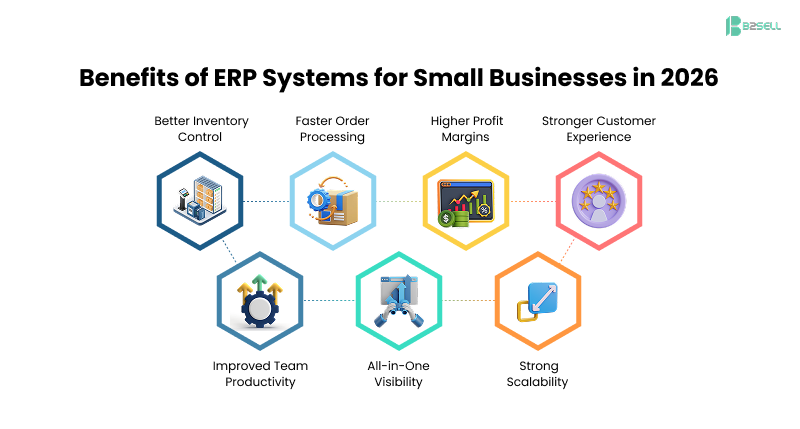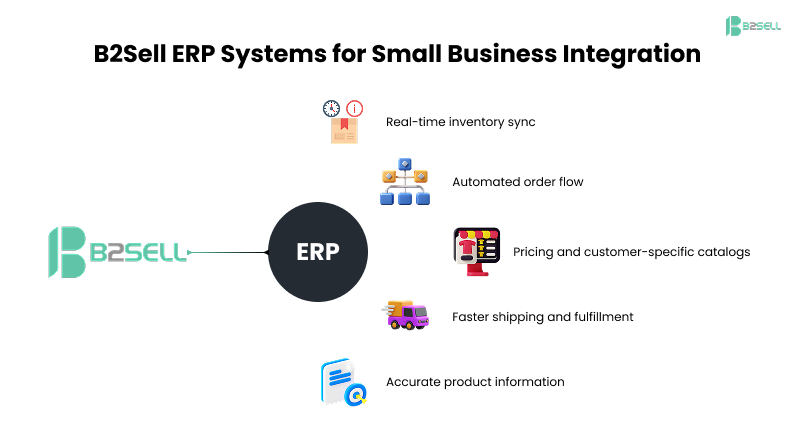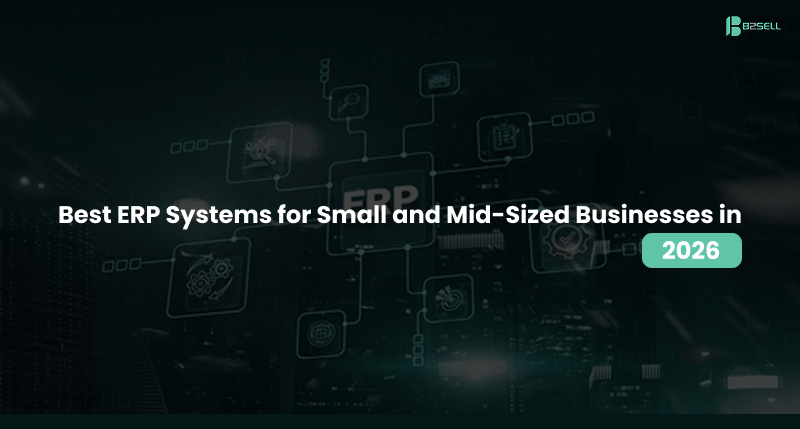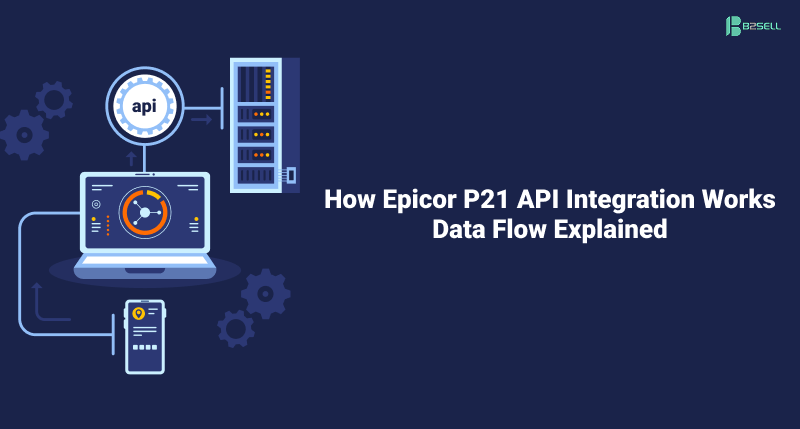Introduction: Why Small Businesses Need the Right ERP in 2026
Running a small or mid-sized business today is more complex than ever. Customer expectations are rising. Supply chains are unpredictable. Teams are stretched. Manual work slows growth and drains profits. This is why choosing the right ERP system for small business has become one of the most important decisions for 2026.
Many owners and operations leaders still manage their business using spreadsheets, disconnected software, or outdated legacy tools. These methods create errors, increase costs, and limit visibility. A modern ERP helps unify your entire operation—inventory, orders, accounting, purchasing, manufacturing, and customer data—into one reliable system.
This guide breaks down what an ERP system is, why it matters in 2026, which platforms are the best ERP systems, and how distributors and manufacturers can get the most out of ERP with the right integration strategy.
What Is an ERP System?
An ERP (Enterprise Resource Planning) system is software that connects every core business function:
- Inventory
- Purchasing
- Sales
- Finance
- Customer service
- Warehousing
- Ecommerce
- Reporting
Instead of jumping between many tools, ERP system software gives your teams one place to manage data and processes. This reduces errors and makes decisions faster.
Types of ERP Systems
B2B distributors typically choose from three main types of ERP systems:

1. Cloud-based ERP systems
- Hosted online
- Low upfront cost
- Automatic updates
- Easy integration
- Best for small and mid-sized businesses
2. On-premises ERP systems
- Installed on company servers
- High control but higher cost
- Requires IT team for maintenance
3. Hybrid ERP systems
- Mix of cloud and on-premises
- Flexible and scalable
Why ERP Systems Matter More in 2026
The distribution industry has changed rapidly:
- Buyers want quick reordering from mobile or online portals.
- Inventory must be accurate down to the minute.
- Vendors expect better forecasting and fewer stockouts.
- Market competition is rising due to digital-first distributors.
A strong ERP system helps distributors manage all these demands with fewer people and less manual work. It becomes the central “engine room” powering your business.
The Core Challenges Distributors Face Today
B2B distributors experience unique operational pain points. These challenges make choosing the top ERP system even more important for 2026.
1. Disconnected systems causing data errors
Teams often use separate tools for:
- Inventory
- Accounting
- Ecommerce
- Order management
This leads to:
- Wrong stock counts
- Delayed shipping
- Duplicate data entry
- Lost orders
2. Slow order processing
Without automation:
- Sales reps update quotes manually
- Customer service confirms availability manually
- Warehouse staff receive late instructions
This slows down the entire selling process.
3. Poor inventory visibility
Distributors need real-time stock levels including:
- Warehouse inventory
- Backorders
- Supplier lead times
- Overstock alerts
- Multi-location transfers
Without this, costly mistakes happen.
4. Rising customer expectations
B2B buyers now expect:
- Fast ordering
- Self-service portals
- Order tracking
- Mobile access
- Accurate product data
These expectations require strong ERP-linked workflows.
5. Manual reporting and forecasting
Most SMB distributors still rely on spreadsheets.
This hurts:
- Demand planning
- Cash flow forecasting
- Reorder accuracy
- Executive decision-making
6. Difficulty integrating ecommerce platforms
With growing online sales, integrating ERP with ecommerce apps is critical.
Tools like:
- Magento
- BigCommerce
- Shopify
- B2Sell Mobile Ordering App
- B2Sell Self-Service Portal
must sync with ERP for true accuracy.
You can learn more about this in the ERP Integration Guide on B2Sell:
Link used contextually: ERP integration helps automate data sync between platforms.
How the Best ERP System Solves These Problems
A strong ERP system for small and mid-sized distributors delivers clear, practical solutions.
1. One unified source of truth
An ERP connects:
- Orders
- Inventory
- Finance
- Warehouse data
- Customers
Everyone sees the same data—always accurate, always updated.
2. Real-time inventory control
Features include:
- Livestock levels
- Barcode scanning
- Multi-warehouse visibility
- Auto-reorder notifications
- Supplier lead time tracking
This prevents stockouts and overstock problems.
3. Automated order management
ERP automation handles:
- Sales order creation
- Purchase orders
- Pricing rules
- Quote approvals
- Backorders
- Shipping
This reduces manual work and speeds up delivery.
4. Built-in financial management
ERP systems simplify:
- Billing
- Invoicing
- GST/Tax management
- Payment tracking
- Banking reconciliation
No more switching between accounting software.
5. Seamless ERP system integration
Using platforms like B2Sell ERP Integration ensures:
- Product sync
- Price sync
- Inventory sync
- Customer sync
- Order sync
between ERP, ecommerce, CRM, and other apps.
Learn more in B2Sell’s ERP integration blogs:
- How ERP helps ecommerce
- ERP integration checklist
- ERP software integration
6. Better planning and forecasting
ERPs provide:
- Sales trend analysis
- Supplier performance
- Seasonal demand planning
- Inventory costing reports
- Cash flow predictions
Decision-making becomes faster and more accurate.
Top Features of the Best ERP Systems for Small and Mid-Sized Distributors in 2026

1. Cloud-first architecture
The best ERP systems are cloud-based because they offer:
- Low IT cost
- Easy scaling
- Better security
- Automatic updates
- Remote access
2. Strong inventory and warehouse capabilities
Key features:
- Batch/lot tracking
- Serial number tracking
- Put-away optimization
- Barcode scanning
- Bin management
- Cycle counting
3. Ecommerce-ready integrations
Your ERP should connect instantly to:
- Online stores
- Distributor portals
- EDI systems
- Mobile ordering apps
- Online catalog apps
4. Simple, clean user interface
Teams should operate the ERP with minimal training.
5. Automation everywhere
Look for:
- Automated PO creation
- Auto stock updates
- Auto pricing rules
- Auto invoice generation
- Auto shipment updates
6. Mobile-friendly access
Modern ERP systems must work on any device.
7. Support for manufacturing (if needed)
If you offer light assembly or custom builds, choose an ERP system for manufacturing with:
- BOM management
- Work orders
- Routing
- Production planning
8. Flexible system integration
The ERP should connect to:
- CRM
- WMS
- PIM
- Marketplaces
- Accounting apps
This is where B2Sell ERP Integration adds strong value.
Real-Life Use Cases for SMB Distributors
Use Case 1: Improving Order Accuracy
Before ERP:
Orders taken by phone and email led to frequent mistakes.
After ERP:
Sales reps enter orders directly into one system.
Inventory updates instantly.
Orders reach the warehouse with correct picking instructions.
Result:
- 60% fewer order errors
- Faster fulfillment
- Higher customer satisfaction
Use Case 2: Reducing Stockouts
Before ERP:
Stockouts happened often because inventory data was outdated.
After ERP:
ERP delivers:
- Real-time stock levels
- Auto low-stock alerts
- Purchase order suggestions
Result:
- 40% reduction in stockouts
- More repeat orders
- Better supplier relationships
Use Case 3: Connecting ERP with Ecommerce
Before ERP:
The online store showed incorrect stock quantities.
Prices were inconsistent.
Orders were synced manually.
After ERP:
Using B2Sell ERP integration:
- Orders sync instantly
- Product data stays accurate
- Inventory updates automatically
Result:
- 75% faster order handling
- 100% accurate product listings
- More online revenue
Top ERP Systems for Small and Mid-Sized Businesses in 2026
Below are the top ERP systems trusted by distributors, manufacturers, retailers, and service companies. They are selected for affordability, scalability, ease of use, and automation capabilities.
1. SAP Business One
A leading ERP for small and mid-sized businesses, SAP B1 offers powerful modules for:
- Accounting
- Inventory
- Distribution
- Manufacturing
- Reporting
- Procurement
Best for: Growing distributors and manufacturers needing strong inventory control.
2. Oracle NetSuite
A fully cloud-based ERP with advanced automation and global capabilities.
Why businesses choose NetSuite:
- Strong financial management
- Real-time dashboards
- Multi-location inventory
- Native ecommerce features
Best for: Fast-scaling companies with online or multi-warehouse operations.
3. Microsoft Dynamics 365 Business Central
A flexible cloud ERP with strong accounting and integrated Microsoft app support.
Strengths:
- Excellent for financial management
- Easy integration with Office 365
- Supports manufacturing and distribution workflows
Best for: Companies that want a familiar Microsoft ecosystem.
4. Infor CloudSuite Industrial (Infor CSI)
Infor is known for its strong industry-specific features.
Why it stands out:
- Advanced manufacturing planning
- Robust supply chain management
- Deep analytics
- Powerful ERP system for manufacturing
Best for: Manufacturers needing detailed BOMs, routing, and shop-floor tracking.
5. Acumatica
A fast-growing cloud ERP with flexible pricing and strong mobile access.
Highlights:
- Real-time dashboards
- Project accounting
- CRM integration
- Multi-industry support
Best for: Small businesses wanting flexible licensing and easy customization.
6. Odoo ERP
An open-source ERP with modular apps.
Advantages:
- Cost-effective
- Highly customizable
- Good for startups and small businesses
Best for: Teams needing basic ERP functionality with room to upgrade.
7. Epicor ERP (Kinetic)
Strong focus on manufacturing and distribution.
Key strengths:
- Shop-floor visibility
- Inventory forecasting
- Complex manufacturing support
Best for: Mid-sized manufacturers needing serious production management.
Benefits of ERP Systems for Small Businesses in 2026

1. Better Inventory Control
Real-time stock view reduces shortages and overstocking.
2. Faster Order Processing
Automation cuts order time by up to 60%.
3. Higher Profit Margins
Better forecasting reduces waste and unnecessary purchases.
4. Stronger Customer Experience
Accurate pricing, faster delivery, and better communication.
5. Improved Team Productivity
Employees focus on important tasks, not data entry.
6. All-in-One Visibility
Decision-makers get a full view of business health.
7. Strong Scalability
ERP grows as the business grows.
B2Sell ERP Integration: The Missing Piece for Small Business Success
Choosing an ERP is only the first step. To unlock its full power, businesses need seamless ERP system integration, and this is where B2Sell becomes essential.
Most businesses struggle because their ERP is not connected to ecommerce, CRM, catalog platforms, PIM, marketplaces, or their ordering portals. This creates the same manual problems they tried to solve.
B2Sell ERP Systems for Small Business Integration
B2Sell helps small and mid-sized businesses integrate their ERP with:
.jpg)
- Ecommerce platforms (Magento, Shopify, BigCommerce, WooCommerce)
- CRM systems
- PIM systems
- Marketplaces (Amazon, Walmart, eBay)
- Custom B2B portals
- Mobile apps and sales rep tools
What B2Sell Integration Solves

- Real-time inventory sync
Customers always see accurate stock levels.
- Automated order flow
Orders flow from ecommerce → ERP → fulfillment without manual work.
- Pricing and customer-specific catalogs
ERP rules sync directly to online platforms.
- Faster shipping and fulfillment
Tracking updates flow automatically to customers.
- Accurate product information
Product data syncs from ERP to all channels instantly.
Why B2Sell Makes ERP Systems More Powerful
- Supports 40+ ecommerce platforms
- No manual data entry
- Reduces errors by up to 80%
- Cuts order processing time by 50–70%
- Gives real-time visibility across all channels
- Fully scalable for high-volume operations
This is why SMEs rely on B2Sell to make their ERP software systems work smarter, faster, and more profitably.
To learn more, see our integration guide:
➡ ERP Integration
Conclusion: Modern ERP Is the Backbone of Distributor Growth
A strong ERP system for small business is no longer just a tool—it is the engine that drives efficiency, profitability, and growth in 2026. With real-time visibility, automation, and integrated workflows, companies can respond faster, serve customers better, and scale with confidence.
When paired with B2Sell ERP integration, your ERP becomes even more powerful—connecting ecommerce, CRM, PIM, and customer portals into one seamless system that works 24/7.
Ready to Modernize Your ERP Workflows?
If you want faster operations, real-time inventory, and seamless ecommerce sync, explore how B2Sell simplifies ERP integration.
👉 Download the ERP Integration Checklist
Your future-ready distribution business starts with the right ERP system.




.png)


.png)